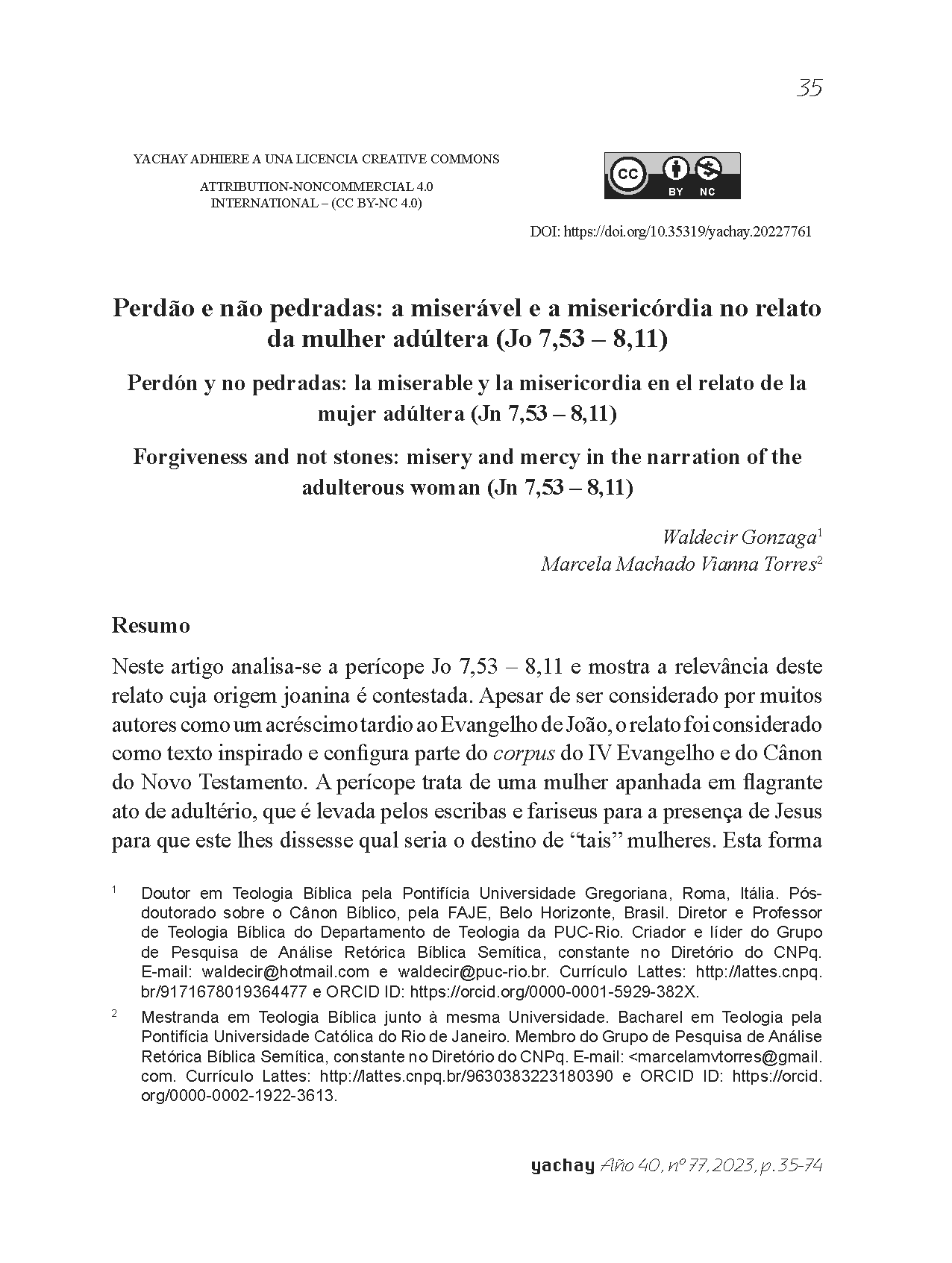Forgiveness and not stones: misery and mercy in the narration of the adulterous woman (Jn 7,53 – 8,11)
DOI:
https://doi.org/10.35319/yachay.20227761Keywords:
Accusation , adulterous woman , sin , scribes and Pharisees , mercyAbstract
This article analyses the pericope Jn 7:53 – 8:11 and shows the relevance of this narration, whose Johannine origin is disputed. Despite being considered by many authors as a late addition to the Gospel of John, the account was considered an inspired text and forms part of the corpus of the IV Gospel and the Canon of the New Testament. The pericope deals with a woman caught in the act of adultery, who is taken to Jesus by the scribes and Pharisees so that he could tell them what would be the fate of “such” women. This way of addressing the woman already exhibits contemptuous language and a pejorative attitude towards her. In addition to the patriarchal scenario, which omits the male figure who had also committed adultery, it is clear that behind the legal concern of the crime in question, there is the disguised intention of putting Jesus to the test in the face of the law of Moses and the power of Caesar. With the authority of a master, Jesus does not answer the question directly, but gives it back in a vital lesson to all those present, teaching that the way is forgiveness and not stoning. The teaching environment is transformed into a legal scenario in which judges, based on the Mosaic Law, are led to face the Law of love and mercy brought by Jesus. The Mosaic Law is overcome after the Christ event; the scribes and Pharisees are not willing to follow the teachings of Jesus and leave the scene without conversion. In this study, the dimension of forgiveness and non-judgment is reflected within the practice and religious understanding that Jesus came to forgive and not to judge. The study is divided into segmentation, translation, textual criticism, delimitation, structure and rhetorical form, analysis of forms, literary genre, comments and conclusion.
Downloads
References
Beasley-Murray, George R. Word Biblical commentary: John, Vol. 36. Texas: Word Books Publisher, 1987.
Berger, Klaus. As formas literárias do Novo Testamento. Loyola: São Paulo, 1984.
Beutler, Johannes. Comentario al evangelio de Juan. Estella (Navarra): Verbo Divino, 2016.
Blank, Joseph. El Evangelio según San Juan. Tomo Primero b (cap V y VII– XII). Barcelona: Herder, 1984.
Brown, Raymond Edward. Comentário ao Evangelho segundo João, Volume 1 (1-2): introdução, tradução e notas. Santo André: Academia Cristã– São Paulo: Paulus, 2020.
Bruce, Frederick Fyvie. João: introdução e comentário. São Paulo: Vida Nova, 2014.
Carson, Donald Arthur. The Gospel according to John. Leicester: Apollos – Michigan: Eerdmans Publishing Group, 1991. DOI: https://doi.org/10.5040/bci-000i
De Vaux, Roland. Instituciones del Antiguo Testamento. Barcelona: Herder, 1976.
Derrett, John Duncan M. Law in the New Testament. Oregon: Wipf & Stock Publishers, 2005.
Francisco. «Angelus», 17 de mayo de 2013. Acceso el 24 de octubre de 2022. https://www.vatican.va/content/francesco/pt/angelus/2013/documents/papa-francesco_angelus_20130317.html.
Gonzaga, Waldecir, «A Sagrada Escritura, a alma da Sagrada Teologia». En Exegese, teologia e pastoral: relações, tensões e desafios, editado por Mazzarollo, Isidoro, Leonardo Agostini Fernandes y Maria de Lourdes Corrêa Lima, 201-235. Rio de Janeiro: PUC-Rio – Santo André Academia: Cristã, 2015.
Gonzaga, Waldecir. Compêndio do Cânon Bíblico: listas bilíngues dos catálogos bíblicos. Antigo Testamento, Novo Testamento e Apócrifos. Rio de Janeiro: PUC-Rio- Petrópolis: Vozes, 2019.
Hahn, Scott y Curtis Mitch. O evangelho de São João. Campinas: Ecclesiae, 2015.
Hendriksen, William. The Gospel according to John, Vol. II: commentary on chapters 7-21. Michigan: Baker Groups, 1983.
Köstenberger, Andreas. John (Baker Exegetical Commentary on the New Testament). Michigan: Grand Rapids, 2004.
Léon-Dufour, Xavier. Lettura dell’Evangelo secondo Giovann. Torino: San Paolo, 2007.
Louw, Johannes Petrus y Eugene A. Nida. Greek-English lexicon of the New Testament: based on semantic domains. New York: United Bible Societies, 1996.
Malzoni, Cláudio Vianney. Evangelho segundo João. São Paulo: Paulinas, 2018.
Martin, Francis y William M. Wright. The Gospel of John. Michigan: Baker Academics, 2015.
Metzger, Bruce Manning. A textual commentary on the Greek New Testament. New York: United Bible Societies, 1971.
Michaels, J. Ramsey. Novo comentário bíblico contemporâneo: João. São Paulo: Vida, 1994.
Moloney, Francis J. Il Vangelo di Giovanni. Torino: Elledici, 2007.
Morris, Leon. The Gospel according to John. Michigan: Grand Rapids, 1995.
Nestle-Aland, eds., Novum Testamentum Graece. Ed. XXVIII. Stuttgart: Deutsche Bibelgesellschaft, 2012.
Niccaci, Alviero y Oscar Battaglia. Comentário ao Evangelho de São João. Petrópolis: Vozes, 2000.
Omanson, Roger L. Variantes textuais do Novo Testamento: análise e avaliação do aparato crítico de «O Novo Testamento Grego». Barueri: Sociedade Bíblica do Brasil, 2010.
Paroschi, Wilson. Crítica textual do Novo Testamento. São Paulo: Vida Nova, 1993.
Pérez Millos, Samuel. Juan: comentário exegético al texto griego del Nuevo Testamento. Barcelona: CLIF, 2016.
Perkins, Pheme, «Evangelho Segundo João». En Novo Comentário Bíblico São Jerônimo: Novo Testamento e artigos sistemáticos, editado por Raymond Edward Brown, Joseph A. Fitzmyer y Roland E. Murphy, 731-816. São Paulo: Paulus, 2018.
Ridderbos, Herman. The Gospel of John: a theological commentary. Michigan: Grand Rapids, 1991.
Rudrum, Alan y Julia Schatz. «The woman taken in adultery: a literary perspective on Christ’s writing in John 8:1-12». Connotations: a Journal for critical debate (Tübingen) 31 (2022): 85-99.
Schnackenburg, Rudolf. Commentario teologico del Nuovo Testamento: il vangelo di Giovanni, parte seconda. Brescia: Paideia, 1977.
Swindoll, Charles. Comentário bíblico Swindoll: João. São Paulo: Hagnos, 2017.
Zumstein, Jean. Il Vangelo secondo Giovanni (1,1–12,50). Torino: Claudiana, 2017.

Published
How to Cite
Issue
Section
License
Copyright (c) 2023 Revista Yachay

This work is licensed under a Creative Commons Attribution-NonCommercial 4.0 International License.
De acuerdo a la Ley 1322 de Derechos de Autor en Bolivia, la Revista YACHAY respeta los derechos morales de los autores, amparando la parternidad e integridad de sus obras publicadas.




